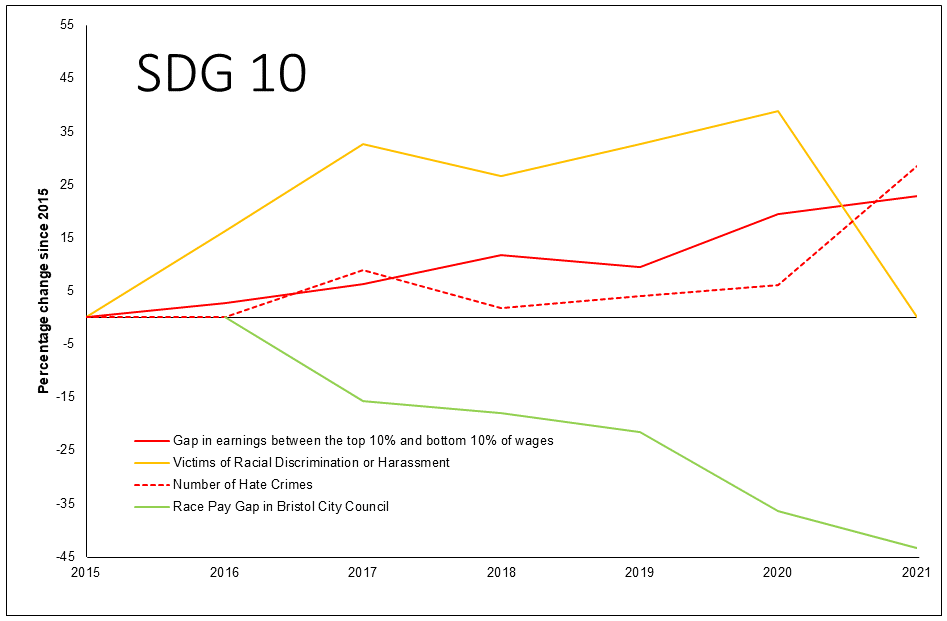SDG 10: Reduced inequalities
What does the data show?
Earnings
Weekly wages for both women and men in Bristol have increased and the city’s gender pay gap narrowed by 54% between 2016 and 2021. However, the gap in earnings between the highest- and lowest-paid 10% of workers has continued to widen for both men and women.
During the pandemic in 2020, weekly wages for the lowest-paid 10% of men and women declined compared to the previous year. At the same time, wages for the top 10% of earners continued to rise. While data for the top male earners is available, data for top earners of women is not statistically reliable. The city gender pay gap and council race pay gap decreased, however, the council gender pay gap grew.
Decline in hate crimes
Total numbers of hate crimes reported grew from 1830 to 2353 cases between 2016 and 2021. Last year, 2021, was the first year that rates of hate crime declined since 2015, falling back down to 2015 levels.
Economic growth and poverty
While the city’s economy grew according to most metrics (see SDG 8: Decent work and economic growth quality), the number of people facing poverty rose (see SDG 1: No poverty) and the gap between the richest and the poorest widened (SDG 10). This shows that while Bristol has achieved economic success, that success has not benefitted everyone in the city and parts of Bristol are being left behind.
SDG 10: Reduced inequalities
Weekly wages for both women and men in Bristol have increased and the city’s gender pay gap narrowed between 2016 and 2021. However, the earnings gap between the bottom 10% of earners and top 10% of earners has been rising.
2021, was the first year that rates of hate crime declined since 2015, falling back down to 2015 levels.
As noted elsewhere, although Bristol has encountered economic success, it has not benefitted everyone within the city.
What Bristol is doing
While recent data is generally discouraging, numerous private, public and non-profit organisations are making serious efforts to reduce inequalities. The following is only a small snapshot of the wide range of activity occurring within Bristol.
Addressing employment inequality
As part of ongoing work with the Trotter Institute at Harvard University to create new pathways to employment for marginalised communities, Bristol City Council’s City Office has been working to map the various city activities aiming to reduce inequalities. Gaining visibility of the totality of this work will enable improved partnership working and further develop the strategic ecosystem of inclusion support in the city.
Support for victims of hate crime
The Bristol Hate Crime and Discrimination Services is a partnership of six organisations, including Off the Record Bristol and Brandon Trust, which offers legal, psychological and physical support for victims of hate crimes and discrimination, as well as providing a reporting service. Project Zazi and Babbasa help young people from disadvantaged areas of Bristol achieve their full potential, providing training, professional mentoring, therapy and counselling. Babbasa is leading on the Our City 2030 initiative, a project working with partners across the city to provide median salary jobs for every household in the city centre.
Bristol’s history
In September 2020, following the toppling of the statue of Edward Colston, Marvin Rees, Mayor of Bristol, set up the We Are Bristol History Commission. The commission comprises a wide range of professional historians and academics from different specialist areas, including philosophy, trade unions, arts and culture, and law.
The purpose of the commission is to help Bristol better understand how it became the city it is today, work with citizens and community groups to ensure everyone in the city can share their views on Bristol’s history, and build an improved, shared understanding of Bristol’s story for future generations. The first report of the commission focused on the future of the Colston statue following a public consultation.
Trends in income inequality and racial discrimination
